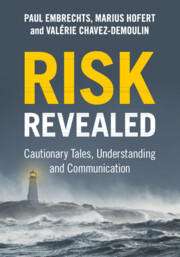Book contents
- Frontmatter
- Dedication
- Contents
- Preface
- Introduction
- 1 The 1953 Great Flood
- 2 The Space Shuttle Challenger Disaster
- 3 The 2007–2008 Financial Crisis
- 4 Earthquakes and Tsunamis
- 5 The L’Aquila Trial and the Public Communication of Risk
- 6 The Coronavirus Pandemic
- 7 Mathematical Wonderland
- 8 Stochastic Modeling
- 9 The Modeling of Extreme Events
- 10 On Climate Change and Related Risk
- 11 Further Examples from the World of Extremes
- 12 Networks
- 13 The Black Tulip and February 3, 1637
- A Note About the References
- References
- Index
6 - The Coronavirus Pandemic
Published online by Cambridge University Press: 05 April 2024
- Frontmatter
- Dedication
- Contents
- Preface
- Introduction
- 1 The 1953 Great Flood
- 2 The Space Shuttle Challenger Disaster
- 3 The 2007–2008 Financial Crisis
- 4 Earthquakes and Tsunamis
- 5 The L’Aquila Trial and the Public Communication of Risk
- 6 The Coronavirus Pandemic
- 7 Mathematical Wonderland
- 8 Stochastic Modeling
- 9 The Modeling of Extreme Events
- 10 On Climate Change and Related Risk
- 11 Further Examples from the World of Extremes
- 12 Networks
- 13 The Black Tulip and February 3, 1637
- A Note About the References
- References
- Index
Summary
Our book was written during the COVID pandemic. As a result, it was natural to include a chapter on this topic. In line with the overall theme of our book, we highlight aspects close to the understanding and communication of risk. Topics included in more detail are the inherent danger of exponential growth and the need for adhering to the precautionary principle when faced with a new, possibly catastrophic and hence not yet widely understood, type of risk. The precautionary principle enables decision-makers to adopt measures when scientific evidence about an environmental or human health hazard is uncertain and the stakes are high. A question we address to some extent is whether this pandemic happened totally unexpectedly; was it a so-called Black Swan? We present evidence that it most certainly was not. We give examples of early warnings from scientific publications, highly visible presentations in the public domain as well as regulatory measures in force to absorb the consequences of a possible pandemic. In discussions around risk, numbers, especially large ones, and also units of measurement play an important role; we offer some guidance here.
Keywords
- Type
- Chapter
- Information
- Risk RevealedCautionary Tales, Understanding and Communication, pp. 67 - 81Publisher: Cambridge University PressPrint publication year: 2024



